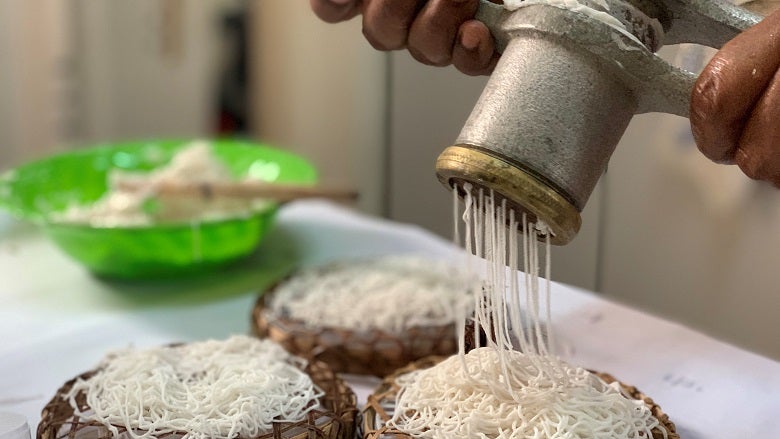 Making idiyappam
Making idiyappam
Findings from the National Financial Inclusion Survey in Sri Lanka, which was led by the Central Bank of Sri Lanka, with technical assistance from IFC, under the IFC-DFAT Women in Work Program in Sri Lanka.
“I never knew I could manage my money from home. Thanks to what I learned today, I will have more time to make idiyappam,” said a young mother who runs a small idiyappam business — a local breakfast staple — from her home in the suburbs of Colombo. She was one of 20 participants at a financial literacy awareness pilot being designed by IFC.
She is not alone. Many women in Sri Lanka lack awareness of new, more convenient financial services enabled via digital means and rarely use them to manage their finances. Sri Lanka ranks high in terms of gender parity in education. Yet, when it comes to financial inclusion — particularly formal finance — women continue to be on the sidelines.
The numbers speak for themselves. The National Financial Inclusion Survey in Sri Lanka, conducted in 2018-19, revealed that women tend to be more comfortable with informal channels such as local, informal banks (24 percent of women compared to 14 percent of men) and other unregulated sources such as microfinance institutions (11 percent of women compared to 8 percent of men). Women are pressed for time, juggling work and caring for family, and often choose to transact within their communities, which limits options to informal sources. Against this backdrop, digital finance could be a powerful lever for women’s transition into formal financial inclusion as it addresses important issues of time, safety, and security.
Closing the gender gap in financial inclusion will require attention to the digital gender gap and digital literacy. Eighty-six percent of men in Sri Lanka own a mobile phone, compared with 79 percent of women. According to the survey findings, 62 percent of women said they were aware they could make financial transactions through mobile phones, but only 32 percent claimed they were comfortable doing it. This highlights the potential impact digital literacy and digital financial awareness can have on increased usage of digital financial services.
When it comes to payment cards, the situation is similar. While ownership of credit and debit cards is slowly increasing, Sri Lanka essentially remains a cash economy, with only 38 percent of the population at ease using debit cards. From a gender perspective, men were more comfortable using debit cards (41 percent men, 35 percent of women).
Since 2018, the Central Bank of Sri Lanka has been partnering with IFC, under the IFC-DFAT Women in Work Program in Sri Lanka, on a comprehensive approach to financial inclusion, leading to the first national financial inclusion strategy. Digital finance is a key pillar of this strategy. This is important, because while Sri Lanka’s digital financial service infrastructure has kept pace with international developments, overall uptake remains low.
The recent announcement of 2020 as the ‘Year for Digital Transactions’ and the trilingual awareness campaign, ‘Cash Wade’ — supported by focused training programs across the country — are initiatives that are part of this national strategy. Working together, we believe digital finance can consequently transform women’s lives and empower more women like the young mother from the pilot training, thus contributing to greater inclusion of all Sri Lankans.
Related: South Asia Economic Focus



Join the Conversation